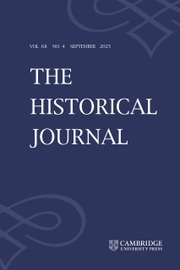(image source: Cambridge Core)
Extract:
Two central features of global history over the past century have been the pre-eminent power of the United States in world politics and the growth of international organizations. The relationship between these phenomena has been variously interpreted, in ways that reflect theoretical and methodological commitments as well as political perspectives. The Realist school, for whom power relationships are always determinative, have followed Carl Schmitt and E. H. Carr in seeing international institutions, and the norms and laws they uphold, as instruments through which dominant powers seek legitimacy as well as influence. By contrast, liberal theorists have viewed the pursuit of a rule-governed world order, and the development of the idea of a ‘world community’, as a more autonomous and broadly based enterprise, one spurred by increased interdependence and greater concern with matters of common interest to all nations – not least that of avoiding the devastating effects of great power warfare in the modern era. As is usually the case with such analytically sharp distinctions, neither of these positions conveys the whole truth
Read more here.

